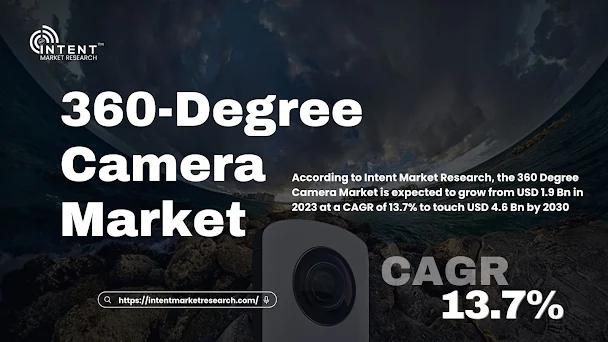The 360-degree camera market has been on a steady rise as users demand more immersive and panoramic visual experiences across industries. These versatile cameras have become integral in fields like real estate, virtual tours, media, and gaming. According to Intent Market Research, the global 360-degree camera market, valued at USD 1.9 billion in 2023, is anticipated to grow at a remarkable compound annual growth rate (CAGR) of 13.7%, reaching an estimated USD 4.6 billion by 2030. In this article, we’ll explore the market dynamics, current trends, key growth drivers, and future predictions shaping the 360-degree camera market.
What is a 360-Degree Camera?
A 360-degree camera is a device equipped with multiple lenses or panoramic capture technology, allowing it to record views in all directions. Unlike standard cameras, 360-degree cameras capture an entire scene at once, making them ideal for immersive experiences in virtual reality (VR), augmented reality (AR), and live streaming.
Access Full Report @ https://intentmarketresearch.com/latest-reports/360-degree-camera-market-4132.html
The Rising Popularity of 360-Degree Cameras
360-degree cameras have gained significant traction among professionals and everyday users who want to enhance visual storytelling or provide an interactive viewing experience. As more industries adopt this technology for its unique capturing abilities, the demand for these cameras has surged, especially in sectors such as entertainment, tourism, and e-commerce.
Market Overview: Projected Growth of the 360-Degree Camera Market
The 360-degree camera market was valued at USD 1.9 billion in 2023 and is projected to grow to USD 4.6 billion by 2030, driven by rapid technological advancements, higher consumer adoption, and increased applications in diverse industries.
Key Factors Driving the Growth of the 360-Degree Camera Market
1. Technological Advancements in Camera Quality and Capabilities
With innovations in image resolution, stabilization, and connectivity, today’s 360-degree cameras offer significantly improved performance. These advancements have made the cameras more accessible and appealing to a broader audience.
2. Growth in AR/VR and Immersive Content Consumption
The popularity of AR and VR content is growing, especially for training, gaming, and tourism applications. 360-degree cameras are the foundation for creating such content, leading to heightened demand in these areas.
3. Increasing Demand from the Real Estate and Travel Sectors
The real estate and travel sectors increasingly use 360-degree cameras for virtual property tours and interactive destination previews. This trend has expanded due to the remote browsing needs accelerated by the COVID-19 pandemic.
4. Rise of Content Creators and Live Streaming
Content creators, influencers, and vloggers have driven the popularity of 360-degree videos for live streaming and engaging storytelling. As social media platforms support more immersive media, the demand for 360-degree cameras grows.
Current Trends in the 360-Degree Camera Market
1. Higher Resolution and Image Quality
Manufacturers are consistently enhancing the image quality of 360-degree cameras, pushing toward 8K resolution and beyond. This improvement enables higher clarity and richer details, especially for professional applications.
2. Compact and Consumer-Friendly Designs
To reach a broader audience, companies are developing compact, easy-to-use 360-degree cameras suitable for consumers with little to no technical expertise. The streamlined design and smartphone integration have made these devices more appealing for casual users.
3. Expanded Integration with Social Media
With popular platforms like YouTube and Facebook now supporting 360-degree video, more users are creating immersive content. This integration encourages social media users to invest in 360-degree cameras for enhanced video content.
4. Multi-Industry Applications: From Security to Medical Fields
The utility of 360-degree cameras is expanding beyond traditional uses to include applications in security and medical imaging, allowing for enhanced surveillance and medical procedure documentation.
Download Sample Report @ https://intentmarketresearch.com/request-sample/360-degree-camera-market-4132.html
Future Projections for the 360-Degree Camera Market
1. Broader Adoption in Professional Sectors
As image quality and software capabilities advance, industries like education, automotive, and construction are anticipated to integrate 360-degree cameras into their regular operations, driving market expansion.
2. Increasing Use in Autonomous Vehicles
360-degree cameras offer comprehensive visual coverage, making them highly suitable for autonomous vehicles. As the autonomous vehicle market grows, so too does the potential demand for high-quality 360-degree camera systems.
3. Enhanced Software and Post-Production Capabilities
Future developments are likely to include advanced editing and post-production software tailored specifically for 360-degree content, which could further enhance the user experience and make these cameras even more attractive.
4. AI Integration for Object Detection and Scene Analysis
As artificial intelligence technology continues to improve, 360-degree cameras will likely integrate AI capabilities to enhance object detection and provide real-time scene analysis, useful in fields like security and environmental monitoring.
Challenges and Risks in the 360-Degree Camera Market
1. High Product Costs and Limited Accessibility
High costs remain a barrier for consumer-level adoption, especially for advanced models with top-tier resolution and features. Reducing costs through economies of scale will be essential for further market penetration.
2. Competition from Smartphone Cameras
While 360-degree cameras offer unique features, smartphone camera quality is constantly improving and may pose competition as phones incorporate features that mimic 360-degree capabilities.
3. Complexity in Content Production and Editing
Creating high-quality 360-degree content requires specialized skills and software, which may deter some users. Simplifying the production and editing process will be essential for attracting a broader audience.
About Us
Intent Market Research (IMR) is dedicated to delivering distinctive market insights, focusing on the sustainable and inclusive growth of our clients. We provide in-depth market research reports and consulting services, empowering businesses to make informed, data-driven decisions.
Our market intelligence reports are grounded in factual and relevant insights across various industries, including chemicals & materials, healthcare, food & beverage, automotive & transportation, energy & power, packaging, industrial equipment, building & construction, aerospace & defense, and semiconductor & electronics, among others.
We adopt a highly collaborative approach, partnering closely with clients to drive transformative changes that benefit all stakeholders. With a strong commitment to innovation, we aim to help businesses expand, build sustainable advantages, and create meaningful, positive impacts.
Contact Us
sales@intentmarketresearch.com
US: +1 463-583-2713

.jpg)


.jpg)
No comments:
Post a Comment